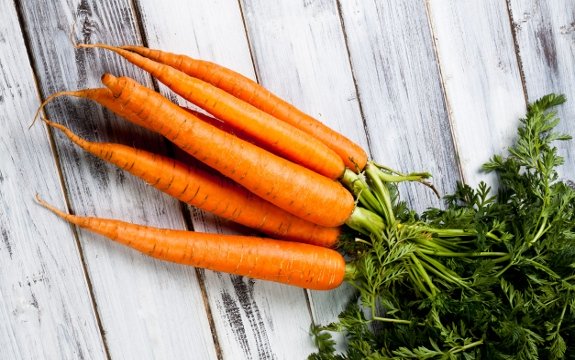Carrots can Reduce Prostate Cancer Risk by Nearly 20%

 Cooked in a roast, or raw and served with hummus, carrots are one of the more popular vegetables around. And the health benefits of these root veggies are many—most notably including vision health. But a new study suggests prostate cancer prevention should move up that list of carrot benefits, and not by any small measure.
Cooked in a roast, or raw and served with hummus, carrots are one of the more popular vegetables around. And the health benefits of these root veggies are many—most notably including vision health. But a new study suggests prostate cancer prevention should move up that list of carrot benefits, and not by any small measure.
According to the Daily Mail, researchers have found that regular consumption of carrots can reduce prostate cancer risk by nearly one-fifth.
Prostate cancer is one of the leading types of cancer in American men, second only to skin cancer. In 2014, the American Cancer Society predicts about 233,000 new cases of prostate cancer will be diagnosed, and about 29,480 men will die from it.
If prostate cancer affects an estimated 1 in 7 men at some point in their lives, it makes sense that we do everything possible to prevent it.
This latest study comes from China, where researchers with Zhejiang University looked at ten different studies outlining the anti-cancer benefits of carrots. Some of those studies found significant anti-prostate-cancer benefits while others found none. Pooling the data, the scientists discovered the benefits are dependent on how often a man eat carrots.
Read: Man and Woman Use Carrots to Treat Stage 4 Cancer
They found that those who ate carrots at least three times a week were 18 percent less likely to have prostate cancer.
Many of the benefits associated with carrots are attributed to their carotenoids. Beta-carotene and lycopene, two of these powerful compounds, have long been thought to have anti-cancer properties.
“We found a significantly decreased risk of prostate cancer associated with a high intake of carrots,” wrote the researchers. “Several potential mechanisms could explain the association between carrot consumption and the risk of prostate cancer. But further well-designed studies are warranted to confirm our findings.”
Critiquing the findings, Dr. Iain Frame of Prostate Cancer UK says the study doesn’t necessarily prove causation, that the men who saw their prostate cancer risk reduction could have ate healthier overall, and that other vegetables can provide similar benefits.
“While there are general health benefits associated with eating a balanced diet rich in vegetables, there is nothing to suggest that one particular vegetable is better than any other,” said Dr. Frame. “The known risk factors for prostate cancer are being 50 and over, having a close male relative with the disease or being of black ancestry.”
Dr. Frame seems to downplay the role of diet in cancer prevention. But those who fit his risk factors should be particularly aware of the potential benefits of eating a diet rich in vegetables, including carrots.
